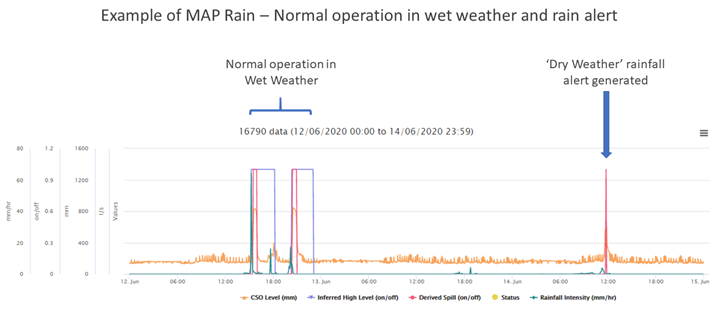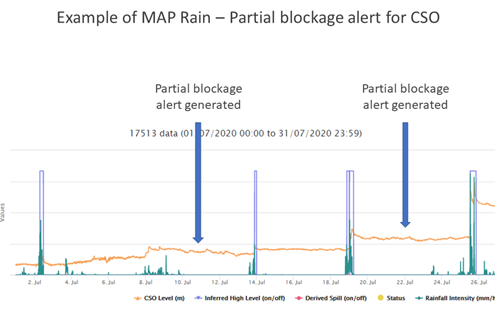Wessex Water CSO/EDM Smart Sewer – 3 month Proof of Concept
The three-month CSO/EDM Smart Sewer trial (June to Augist 2020) provided a great opportunity to test and enhance our MAP Rain service in a collaborative and solutions-focused environment. As a result of the trial, Meniscus were invited to tender for the monitoring of all the company’s CSOs.
MAP Rain is our cloud-based service combining radar and forecast rainfall with operational data. Using machine learning, we use historical data to characterise how rainfall impacts each asset (i.e. CSO). So, this lets us compare how the asset is actually working to how we predict it is should be working. All this happend in real-time as rainfall and CSO alert data becomes available. We use these insights to generate ‘alerts’ that are e-mailed or made available via the MAP Rain API. These insights help reduce alert volumes in the control room as we classify when an asset is operating as expected during a rain event. During the POC we were fortunate enough to have some varied periods of rain so we could review how MAP Rain worked across a broad range of rain events.
This trial was managed as part of the Wessex Water Martketplace which is a great example of innovation in the water sector.
Overall, in the period from the 1st June 2020 to the beginning of 6th August 2020 we identified 90 separate ‘alerts’ for a range of ‘Dry Weather’, ‘Post Storm’ and ‘Inferred Blockage’ events. Over 90% of the CSO spill data received from the Wessex telemetry system was classified as ‘Normal operation in wet weather’ and represents the times when the CSO is operating as expected. We reviewed each ‘alert’ and confirmed its validity and the operational impact/significance to Wessex Water.
This review process identified a number of small changes that we implemented straight away i.e. fixing data timing discrepancies, but a few changes are more significant and have involved quite a bit of time in the development, testing and deployment of solutions. An interactive POC like this is an excellent catalyser to this process.
On a more strategic level, we have had the opportunity to review, discuss and challenge the efficacy of these assets, and the insights we generate, with the Wessex POC team. This has been invaluable as it gives us a better understanding of how this data will, or will not, be used to achieve reductions in pollutions. As a consequence, we have implemented changes in our service that have both reduced the number of ‘alerts’ generated whilst improving the validity of the ‘alerts’ that we do send out to the Wessex team.
The overall concept behind the Wessex Water Marketplace is one that we are wholly supportive of. The challenge itself was clearly defined. The review process was thorough and the innovation to pay suppliers for the POC is so important for smaller companies and demonstrates Wessex Water’s intent to engage with the process. Maybe these factors are the reason why a large number of companies applied to this, and other, Marketplace challenges.
For more information on the Meniscus Analytics Platform and how it works then click here.



